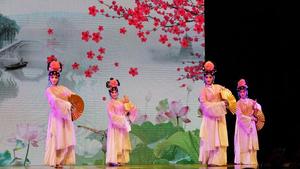Food and family are focus of Spring Festival celebrations for sultanate’s ethnic Chinese community
 Dancers perform at the opening of the China-Brunei Year of Tourism 2020 in Bandar Seri Begawan, Jan 17, 2020. (PHOTO PROVIDED TO CHINA DAILY)
Dancers perform at the opening of the China-Brunei Year of Tourism 2020 in Bandar Seri Begawan, Jan 17, 2020. (PHOTO PROVIDED TO CHINA DAILY)
For yoga teacher Oh Dee Xiang, celebrating Spring Festival in Brunei means a lot of “open houses”.
“We go to our friends’ and relatives’ homes. There’s lots of eating, watching lion dances and giving hongbao,” she said, referring to the traditional red envelopes containing cash gifts.
Bruneians celebrate major festivals and holidays by inviting friends, colleagues and neighbors into their homes for a day of feasting.
So, when Chinese families in Brunei organize open houses to celebrate the Lunar New Year, it also promotes closer ties in the wider community, said freelance writer and translator Shareen Han. The families encourage relatives and friends to visit, offering Chinese New Year greetings to each other.
Han said prawn crackers, cookies and kueh — local cakes — are a staple of most open house celebrations.
Han was expecting a busy week this week as her family prepares for Spring Festival. It begins by carrying out the annual spring cleaning “to get rid of dirt or bad luck”. She and her siblings then decorate the house with traditional lanterns, and paste fu, or good fortune, characters on doors and walls.
On Lunar New Year’s Eve — which falls on Jan 24 — Han’s family will burn incense and joss sticks as offerings for deceased ancestors. Her mother will also be busy in the kitchen with the annual family reunion dinner. Various dishes will be served, each representing some of the family’s hopes for the coming year.
“We will feast on poached whole chicken (symbolizing rebirth or completeness), Hainanese fish maw soup, roast pork (representing wealth), roast duck and vegetable dishes, which symbolize good family ties and prosperity,” Han said.
On Lunar New Year’s Day, Han will go to the temple to pray for blessings and protection in the Year of the Rat.
Debbie Too, a banker in Bandar Seri Begawan, Brunei’s capital, said she will drive to her parents’ house on the first day of Spring Festival to light a joss stick in front of the family altar and say a prayer.
“I have adopted my husband’s family tradition. They are less religious than mine (but) they focus on catching up with everyone each year,” she said.
As a child, Too said morning prayers with her family on Lunar New Year’s Day, and she intends to continue this tradition. She also expects her mother to serve the customary meal of orange, pineapple, tea and sweets — all of which are meant to attract health and wealth for the new year.
Brunei is home to more than 40,000 ethnic Chinese, accounting for about 10 percent of the sultanate’s predominantly Malay population. Some of them are descendants of traders who arrived during the Song Dynasty (960-1279). In 1929, the discovery of an oil well in the northeastern district of Seria also attracted Chinese migrants.
One of the most prominent Chinese merchants in Brunei during the early part of the 20th century was Cheok Boon Siok, who donated land to build a Chinese temple in 1918. To this day, the Teng Yun Temple, which overlooks the Brunei River in Bandar Seri Begawan, remains a focal point for the Chinese community.
Most visitors to this Taoist temple on Lunar New Year’s Day pay respects to their ancestors, burn joss sticks and incense, and pray for good health, peace and prosperity for the coming year. Later, they watch a lion dance performance.
The temple is one of the few public places in Brunei where the government allows lion dances to be staged. The use of firecrackers and fireworks has been banned for safety reasons.
Spring Festival celebrations in Brunei last for 15 days, with another big family dinner usually held on the final day of festivities. In addition to open houses, some people use the holiday to travel and bond with family members. Others enjoy holding reunion dinners in hotels and restaurants.
Preparations for Spring Festival are in full swing across Asia.
In the Philippines, feng shui consultants are giving advice on auspicious colors and decorations for the Year of the Rat.
In the Malaysian city of Ipoh, home to a large ethnic Chinese population, vendors are selling green bamboo plants — popular home decorations — as they symbolize prosperity and happiness.
Lion dance performances and red lanterns feature on the streets of Chinatown in Surakarta, Central Java, Indonesia.
In Singapore, Istana, the official residence of the city-state’s president, will be open to the public on Jan 26, the second day of Chinese New Year, and visitors can watch lion dancing, Chinese dancing and drum performances for free.


